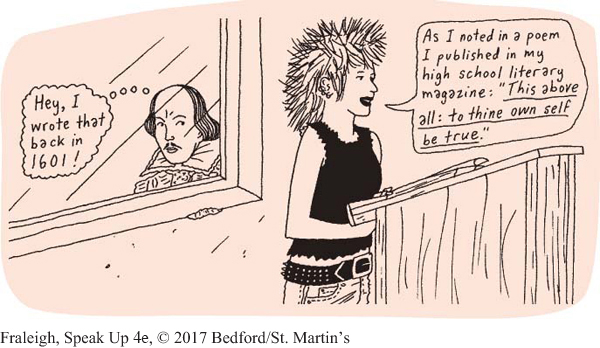Quoting From a Source
Suppose a student named Larissa was planning a speech about the history of drive-
When trying to research the topic, however, Larissa could find little or no material beyond the magazine article she had found in the airport. Panic set in as the day for her in-
It turned out that the magazine article had appeared simultaneously in several different publications, including a large national newspaper where Larissa’s instructor had read it. Larissa earned an F in the class and was suspended from school.
Page 80
Clearly, what Larissa did constituted plagiarism. But what if she had taken only one-
Plagiarism is particularly common among students who research their speech topics online. The temptation to lift and use text from a Web site can be overwhelming, but doing so without attribution is stealing. Students face the related danger of unintentional plagiarism when they copy a quotation from a source and paste it into their notes without writing down the citation information. When they return to their notes later, they may not remember that they had copied and pasted the material as opposed to writing it themselves.
Most of the direct quotations you use in a speech will be short—
As Roberta Gonzales wrote in the June 19 issue of Nevada Horizons (D4), “The growth and popularity of drive-
The first part of this sentence is the attribution, which includes the page number. In delivering your speech, it’s OK not to cite the page numbers of all your sources. However, we strongly suggest that you document a complete citation on your speech outline or text. That way, anyone (including your instructor) who wants to check your facts can easily do so. Before preparing your speech, make sure to check with your instructor to find out if he or she has additional expectations for proper attribution.
To see an example of citing sources, watch Video Activity 3.2, “Citing Someone Else’s Idea.”
Page 81
